



Orange Historical Society


Orange, Connecticut
History of Orange
Though
small
in
area,
the
Town
of
Orange
has
a
rich
and
varied
history
having
been
founded
by
the
colonists
of
Milford
in
1639.
Mary
R.
Woodruff,
in
her
History
of
Orange
makes
a
comparison
to
the
seven
hills
of
Rome
and
our
town
indeed
consists
of
seven
hills:
Turkey
Hill,
Grassy
Hill,
Marsh
Hill,
Indian
Hill,
Cemetery
Hill,
Long
Hill
and the most intriguing, George's Cellar Hill.
Our
town
got
its
start
from
Milford,
whose
earliest
settlers
called
their
colony
Wepawaug,
a
Native
American
word
meaning
'small
crossing
place.'
The
Paugussetts
living
there
welcomed
the
English
and
sold
them
pieces
of
land
as
the
newcomers'
population
grew.
In
1700,
the
settlers
purchased
acreage
to
the
northeast,
establishing
a
settlement
known
as
Bryan's
Farms.
The
Milford
colony,
in
the
custom
of
the
day,
was
governed
by
its
religious
hierarchy
and,
since
ecclesiastical
activities
were
paramount
in
daily
life,
only
those
in
the
church
could
wield
authority
over
the
community.
As
more
people
settled
farther
from
the
center
of
the
Milford
colony,
the
North
Milford
section
requested
its
own
religious
services
to
be
held
locally.
In
1822, political separation was granted by the Connecticut legislature and the Town of Orange was incorporated.
Western connections...
Orange Village, Ohio
As
our
history
section
says,
our
town
was
named
after
Prince
William
of
Orange,
sometime
before
the
incorporation
of
1822.
As
early
as
1815,
many
families
from
Connecticut
moved
to
the
Connecticut
Reserve
in
Ohio.
The
name
Orange
was
once
again
used,
this
time
to
honor
the
hometown
of
several
of
its
early
settlers.
Orange
Village
was
originally
part
of
Orange
Township
that
was
formed
in
1820.
Of
interest
in
the
history
of
Orange
Village,
is
the
name
Serenus
Burnett,
who
is
considered
by
Orange
Village
to
be
their
first
settler
in
1815.
History notes that Serenus' father Edmund was baptized at the Presbyterian Church of Orange, NJ ca 1750.
The City of Orange Township, NJ
Like
so
many
New
World
communities,
settlement
in
Newark
stemmed
from
religious
controversy.
Founded
by
a
group
of
Puritans
from
Connecticut
having
been
shocked
by
the
increasing
interference
of
civil
authorities
in
the
affairs
of
the
church.
They
emigrated
to
New
Jersey
in
1666
to
found
what
is
now
the
First
Presbyterian
Church
of
Newark.
As
more
settlers
arrived,
more
land
was
purchased
from
the
Leni-Lenape
Indians.
Among
the
negotiators
was
Robert
Treat,
a
name
often
associated
with
the
founding
of
Milford,
CT
in
1639.
As
with
North
Milford,
the
distance
traveled
for
religious
services
caused
a
separation
and
in
1780,
Orange,
New
Jersey
was
incorporated,
no
doubt
honoring William of Orange whose name was a household word among the Puritans.
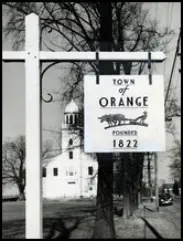












Bryan Andrew


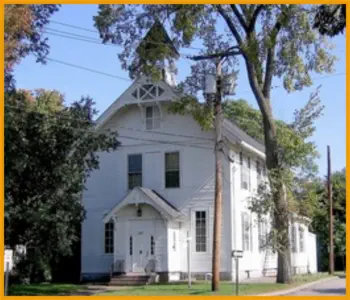
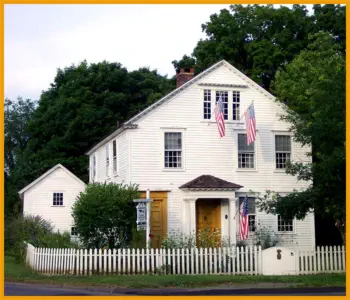
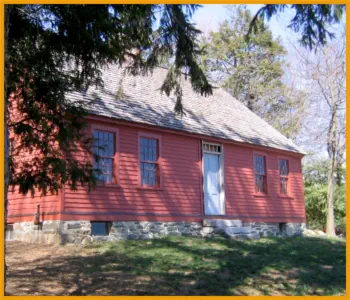


History of Orange
Town beginnings...
Though
small
in
area,
the
Town
of
Orange
has
a
rich
and
varied
history
having
been
founded
by
the
colonists
of
Milford
in
1639.
Mary
R.
Woodruff,
in
her
History
of
Orange
makes
a
comparison
to
the
seven
hills
of
Rome
and
our
town
indeed
consists
of
seven
hills:
Turkey
Hill,
Grassy
Hill,
Marsh
Hill,
Indian
Hill,
Cemetery
Hill,
Long
Hill
and
the
most
intriguing, George's Cellar Hill.
Our
town
got
its
start
from
Milford,
whose
earliest
settlers
called
their
colony
Wepawaug,
a
Native
American
word
meaning
'small
crossing
place.'
The
Paugussetts
living
there
welcomed
the
English
and
sold
them
pieces
of
land
as
the
newcomers'
population
grew.
In
1700,
the
settlers
purchased
acreage
to
the
northeast,
establishing
a
settlement
known
as
Bryan's
Farms.
The
Milford
colony,
in
the
custom
of
the
day,
was
governed
by
its
religious
hierarchy
and,
since
ecclesiastical
activities
were
paramount
in
daily
life,
only
those
in
the
church
could
wield
authority
over
the
community.
As
more
people
settled
farther
from
the
center
of
the
Milford
colony,
the
North
Milford
section
requested
its
own
religious
services
to
be
held
locally.
In
1822,
political
separation
was
granted
by
the
Connecticut
legislature
and the Town of Orange was incorporated.
Western connections...
Orange Village, Ohio
As
our
history
section
says,
our
town
was
named
after
Prince
William
of
Orange,
sometime
before
the
incorporation
of
1822.
As
early
as
1815,
many
families
from
Connecticut
moved
to
the
Connecticut
Reserve
in
Ohio.
The
name
Orange
was
once
again
used,
this
time
to
honor
the
hometown
of
several
of
its
early
settlers.
Orange
Village
was
originally
part
of
Orange
Township
that
was
formed
in
1820.
Of
interest
in
the
history
of
Orange
Village,
is
the
name
Serenus
Burnett,
who
is
considered
by
Orange
Village
to
be
their
first
settler
in
1815.
History
notes
that
Serenus'
father
Edmund
was
baptized
at
the
Presbyterian
Church of Orange, NJ ca 1750.
The City of Orange Township, NJ
Like
so
many
New
World
communities,
settlement
in
Newark
stemmed
from
religious
controversy.
Founded
by
a
group
of
Puritans
from
Connecticut
having
been
shocked
by
the
increasing
interference
of
civil
authorities
in
the
affairs
of
the
church.
They
emigrated
to
New
Jersey
in
1666
to
found
what
is
now
the
First
Presbyterian
Church
of
Newark.
As
more
settlers
arrived,
more
land
was
purchased
from
the
Leni-Lenape
Indians.
Among
the
negotiators
was
Robert
Treat,
a
name
often
associated
with
the
founding
of
Milford,
CT
in
1639.
As
with
North
Milford,
the
distance
traveled
for
religious
services
caused
a
separation
and
in
1780,
Orange,
New
Jersey
was
incorporated,
no
doubt
honoring
William
of
Orange
whose
name
was
a
household
word
among
the Puritans.
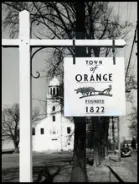

Orange Historical Society
Orange, Connecticut








Bryan Andrew


























































































